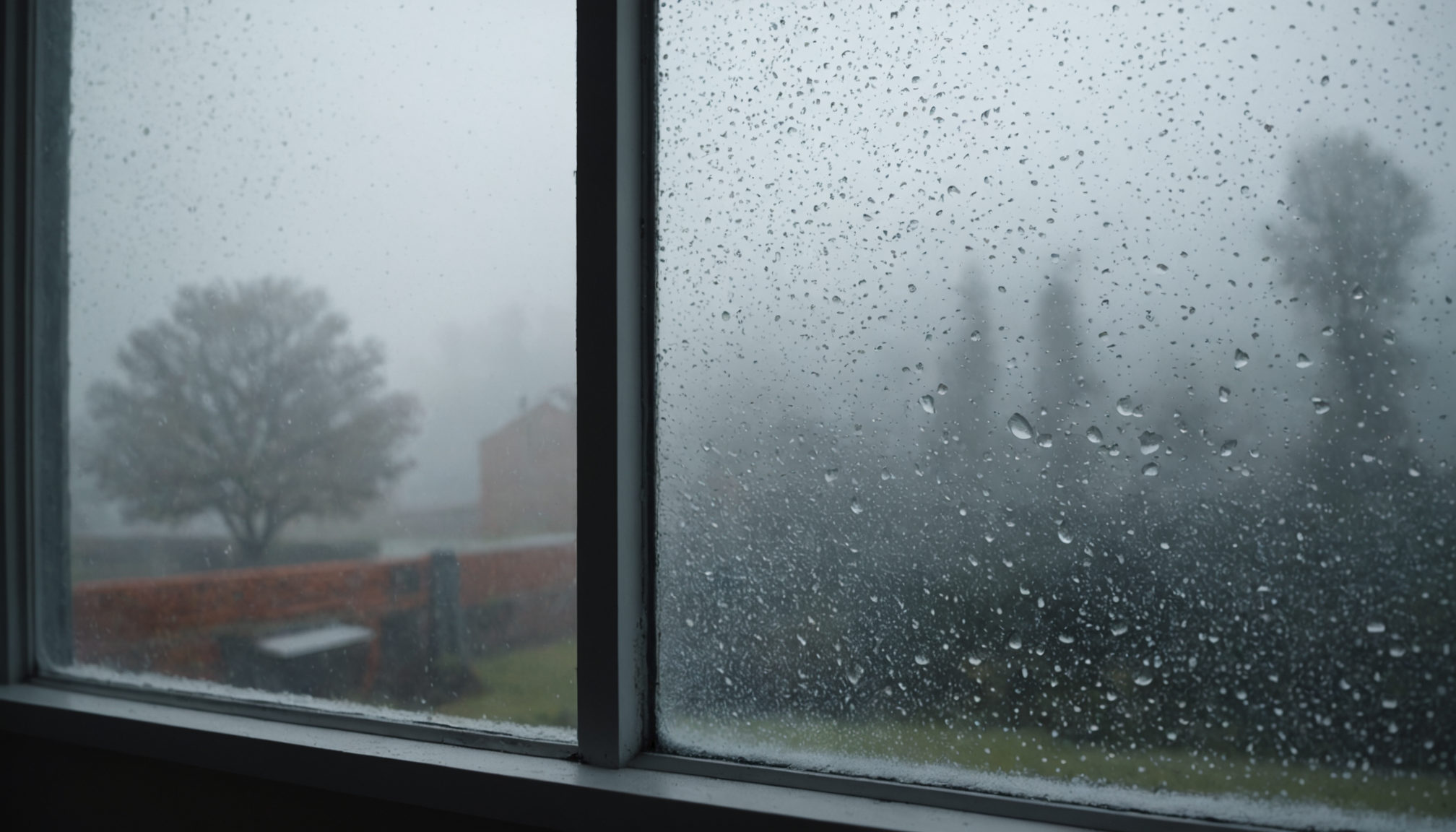Common causes of window fogging
A variety of factors can lead to the fogging of double-pane windows, especially those in climates similar to St. Louis. Among the most significant causes is a failure in the glazing seal. Over time, the sealant that keeps the panes airtight can dry out, crack, or become damaged due to prolonged exposure to UV rays and fluctuating temperatures. This degradation allows moisture-laden air to infiltrate the space between the panes, resulting in condensation.
Another common cause of window fogging is poor installation. If the windows were not properly fitted, the seals might not uniformly adhere to the frame, leading to early failure and subsequent fogging. The importance of professional installation cannot be overstated, as it ensures that each window is secure, providing a tight seal against external elements.
Temperature fluctuations in regions such as St. Louis also play a crucial role in window fogging. The expansion and contraction of the window materials due to weather changes can stress the seals, leading to their eventual failure. Additionally, homes that maintain a significant temperature disparity between the interior and exterior might experience more frequent fogging issues due to constant thermal stress.
Lastly, natural wear and tear can gradually impair the effectiveness of the seals. Double-pane windows typically last between 10 to 20 years, but their longevity can be considerably shortened by environmental factors or poor maintenance. Regular inspections and maintenance are essential to prolonging window life and preventing fogging issues from arising prematurely.
- Sealant degradation due to UV exposure and temperature changes is a leading cause of window fogging.
- Poor installation can compromise the seals, leading to early fogging issues.
- Significant temperature fluctuations exacerbate the stress on window materials, accelerating seal failure.
- Regular maintenance helps extend the lifespan of double-pane windows, reducing fogging occurrences.
- Natural wear and tear over time can diminish seal effectiveness, necessitating either replacement or resealing.
Pros and cons of replacing double-pane windows
When considering replacing fogged double-pane windows, there are several factors to weigh carefully. One of the main advantages of replacement is that it ensures a full restoration of the window’s integrity and performance. Brand new windows come with fresh seals and up-to-date technologies that enhance energy efficiency. Many modern windows feature advances such as improved glazing techniques, heat-resistant coatings, and more robust sealant materials. These enhancements help in minimizing future occurrences of condensation, thereby reducing energy bills and improving indoor comfort.
Replacing windows can also significantly enhance the aesthetic appeal of a home. New windows can offer modern design options and better curb appeal, potentially increasing the property’s market value. Furthermore, with many energy-efficient models, homeowners in areas like St. Louis may qualify for rebates or tax incentives, providing additional financial benefits.
However, there are drawbacks to consider. The upfront cost of window replacement can be quite substantial, especially if multiple windows need to be replaced at once. This expense can be daunting, and not all homeowners have the budget to undertake such an investment immediately. Moreover, the process of window replacement is more invasive than resealing. It involves more extended installation times and may disrupt daily routines, particularly if residing in a region with unpredictable weather patterns, as seen in St. Louis.
There’s also the concern about environmental impact. Disposing of old windows contributes to waste, whereas resealing might be a more sustainable approach, prolonging the life of existing units. For those who are environmentally conscious, this aspect might weigh heavily on the decision.
Homeowners need to avoid rushing into a replacement without fully evaluating their windows’ current condition. Sometimes, what seems like a fogging issue could be a minor sealant problem that resealing can adequately address. Consulting with a reliable professional can help determine the severity of the glazing seal failure and guide the decision-making process.
In summary, while replacing fogged double-pane windows can lead to significant long-term benefits, it is crucial to consider the financial implications and whether such a move is environmentally responsible. Homeowners are advised to carefully assess their situation and, if necessary, seek professional advice to make an informed choice that balances cost, performance, and sustainability.
Benefits of resealing fogged windows
Resealing fogged double-pane windows offers a range of compelling benefits that can significantly impact both energy efficiency and overall home comfort. For many homeowners in St. Louis, where weather conditions often lead to fogging, resealing serves as a practical solution that extends the life of existing windows without the need for a full replacement.
One primary advantage of resealing is cost-effectiveness. Compared to the substantial expense of replacing entire window units, resealing is generally more affordable. It addresses the root cause of condensation between the panes by restoring the seal’s integrity, preventing further moisture infiltration. This can result in immediate savings on both utility bills and the cost of replacing entire window units.
Resealing also helps in maintaining or even enhancing the energy efficiency of your existing windows. By re-establishing the airtight barrier that prevents thermal exchange, resealed windows can bolster your home’s insulation. This ensures that St. Louis homeowners can maintain a consistent indoor temperature without the persistent struggle with drafts or temperature fluctuations common to fogged windows. As a result, heating and cooling systems operate more efficiently, which can have a tangible impact on reducing energy consumption and associated costs.
An often-overlooked benefit of resealing is its potential to improve indoor air quality. By blocking moisture infiltration, resealing minimizes the risk of mold and mildew growth that can occur with ongoing condensation issues. These airborne contaminants can contribute to health problems, making it critical for households to maintain dry, clean, and well-sealed window units.
From an environmental perspective, resealing is a more sustainable choice than window replacement. By opting to reseal, homeowners reduce waste and lessen the demand for raw materials associated with manufacturing new windows. This conscious decision aligns with sustainable living practices, helping to decrease the homeowner’s carbon footprint.
Aesthetic integrity is another important consideration. Resealing can restore the clear view and appeal of your existing windows, eliminating the unsightly fog that detracts from curb appeal without undergoing the extensive process of window replacement.
Homeowners should approach the decision to reseal with thoughtful consideration, acknowledging the specific condition and needs of their windows. Regular inspections and maintenance can help identify issues early, allowing for timely resealing that extends the life of the windows. Consulting with a professional is advisable to ensure that resealing is the right solution for your specific circumstances.
Taking proactive steps through resealing can lead to a more comfortable, sustainable, and economically sound living environment. Embrace the opportunity to renew your windows’ performance with confidence, knowing that your choice supports both your home’s value and the well-being of the planet.
Making the right choice for your home
In making the right decision for your home’s windows, a nuanced approach is crucial. Homeowners in St. Louis should start by assessing the severity of the condensation problem within their double-pane windows. Small amounts of fogging might only require simple maintenance or resealing, whereas more extensive damage could necessitate a complete replacement. Consulting with window experts can provide a clearer understanding of whether the glazing seals are moderately damaged or if a full replacement is warranted due to significant compromise in the window’s integrity.
Consider the budget constraints and environmental impact as well. Resealing, while more economical and environmentally responsible, may not restore excessive damage. Alternatively, opting for new windows can be a larger investment but might provide longer-term benefits through improved energy efficiency and potential rebates for energy-efficient installations. Evaluate your home’s specific needs and weigh them against the benefits and downsides of each choice to make an informed decision that aligns with your financial and sustainability goals.
While the choice between replacing and resealing can seem daunting, the key is to look at your unique situation holistically. Whether focusing on maintaining existing structures or investing in new installations, prioritize efforts that align with enhancing both the home’s resilience against St. Louis’s challenging weather and the energy efficiency to keep internal climates stable. By considering the insights from professional evaluations alongside personal priorities, homeowners can ensure continued comfort and functionality, all while supporting the long-term health of their property and environment.
- Why do double-pane windows in St. Louis fog up so often?
- Double-pane windows often fog up due to sealant failure, which allows moisture to seep between the panes. St. Louis’s weather conditions, including temperature fluctuations and humidity, contribute to significant stress on window seals, leading to fogging over time.
- Is it better to replace or reseal my fogged windows?
- Deciding between replacing or resealing depends on the extent of the damage and your budget. Resealing is less expensive and more sustainable if the damage is minor, while replacing is more advisable for severely compromised windows to restore complete functionality and efficiency.
- How long does resealing last for fogged windows?
- Resealing can extend the life of double-pane windows by several years, depending on the quality of the work and materials used. Regular maintenance and inspections can further ensure that resealed windows remain effective at preventing moisture infiltration.
- Can resealing improve the energy efficiency of my windows?
- Yes, resealing restores the airtight barrier, which helps prevent thermal exchange and maintains a consistent indoor temperature. This improvement can lead to reduced energy usage and lower heating and cooling costs.
- Are there benefits to hiring professionals to assess fogged windows?
- Hiring professionals ensures accurate diagnosis of fogging problems and helps determine the right solution—be it resealing or replacement. Experts provide valuable insights into the condition of your windows, guiding informed decisions tailored to your specific home needs.

